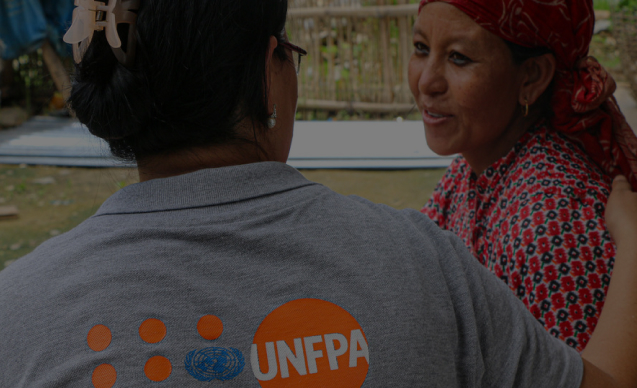UNFPA in Lao
UNFPA is the United Nations sexual and reproductive health agency. Our mission is to deliver a world where every pregnancy is wanted, every childbirth is safe and every young person's potential is fulfilled.
The Lao People's Democratic Republic (Lao PDR) is a landlocked country bordering China, Viet Nam, Cambodia, Thailand and Myanmar. Lao PDR is a diverse country with 49 officially recognized ethnic groups. The total population is slightly over seven million (in 2020), with 58 percent of the total population under the age of 25 years. The country is in the early stages of a demographic transition, changing mortality, fertility, and growth rates, combined with growing urbanization. Such a shift indicates a window of opportunity to benefit from a demographic dividend that will have the largest share of the working-age population and fewer dependents.
However, Lao PDR has a high adolescent birth rate and maternal mortality ratio in the region.
- In 2016–2017, 23.5% of girls aged 15–19 years were married and the national average shows that 83 of every 1,000 girls aged 15–19 had given birth. The adolescent birth rate is higher among the poorest and ethnic minorities in remote areas. About 41.8% of girls aged 15-17 are out of school.
- Despite a significant reduction in maternal mortality, the ratios remained high at 185 deaths per 100,000 in 2017. As of 2017, unmet need for family planning is at 14.3 % for married women and 75.4 % for unmarried women.
The government is a signatory of the International Conference on Population and Development (ICPD) and it reaffirmed its commitment at the ICPD25 Nairobi Summit in 2019 which aims to achieve zero unmet need for family planning, zero preventable maternal deaths, zero gender-based violence and harmful practices such as child marriage and adolescent pregnancy by 2030.
Since 1976, UNFPA has supported the Government of Laos towards achieving universal access to sexual and reproductive health and rights for all. We assist the government in accelerating the implementation of the ICPD Program of Action in line with the Lao National Socio-Economic Development Plan, the 2030 Agenda for Sustainable Development. Guided by the UNFPA Strategic Plan, our five-year Country Program (CP) supports the government to fulfill its commitment to ICPD25.
1. Ending the unmet need for family planning
Family planning is central to the rights and empowerment of women. Every woman and girl has the right to accessible, affordable and quality family planning service. Yet, many women do not use contraceptives due to various factors. As of 2017, the unmet need for family planning is at 14.3% for married women and the percentage is much higher among unmarried women at 75.4%.
We work with the government and partners to promote universal access to sexual and reproductive health information and services, promote comprehensive sexuality education to empower women and girls to exercise their rights, choices and autonomy over their reproductive and sexual health.
2. Ending preventable maternal deaths
No woman should die because of pregnancy and childbirth. All pregnant women must access essential maternal health services including safe pregnancy and childbirth. In Laos, despite progress, maternal death ratios remained high at 185 deaths per 100,000 in 2017.
Ensuring safe motherhood is core to our mandate. We work with the government and partners to strengthen health systems, train health workers, educate midwives to international standards and improve access to the full range of reproductive health.
3. Ending gender-based violence and harmful practices
Violence against women and girls is the violation of human rights. The national report (2015) states that one in seven women have experienced physical or sexual violence from their partners at least once in their lifetime. GBV has serious direct and indirect consequences on women’s physical and mental health, in the short and long terms.
We work with the government and partners to respond to GBV through strengthening instruments and law enforcement on gender equality, violence against women and children, establishing multi-sectoral mechanism to address and respond to GBV which involve sectors from justice, health and social protection including male engagement and psychosocial supports to the victims.
We implement our CP at both policy and service delivery levels. At the policy level, we ensure an enabling environment and engage in policy dialogues and support population data collection to provide policy advice and evidence-based policy briefs for decision making. At the service delivery level, we support strengthening the health system, provide technical assistance, capacity building to the government officials, health providers, midwives, counselors, and service providers at the central and provincial levels.
In a humanitarian setting, we work alongside the government and partners to respond to the emergency situations including natural disasters and disease outbreaks. We provide dignity kits and hygiene products to women and girls to meet their essential needs which is often overlooked during such a situation.
We work closely with our implementing partners such as the Ministry of Health, Ministry of Education and Sports, Lao Youth Union, Lao Women Union, Ministry of Planning and Investment. We partner with the UN agencies in Laos, development partners, donors, private sectors, adolescents and young people. Leveraging partnership with various sectors is essential and key to achieve transformative results.
We implement our programs in Savannakhet, LuangNamtha, Oudomxay, LuangPrabang, Bokeo provinces and Vientiane Capital.




